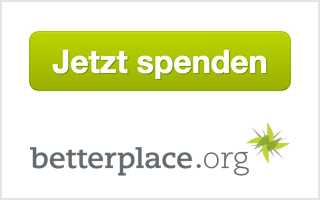Mission statement: Solar powered light for a better education in Burkina Faso!
The Problem
Education is of great importance for the independent development of any nation. In more and more small villages in Burkina Faso primary schools have been established an increasing number of parents are sending their children to school, as the opportunities that a good education offer are being increasingly appreciated. Nevertheless illiteracy in Burkina Faso still stands at approximately 75%, a very high proportion. There are quite clearly a host of reasons why only a small propertion of children in villages achieve a primary school education: for many families their nearest school is simply too far away; many parents are not able to finance their children’s education or require them to stay at home to help out in the fields.
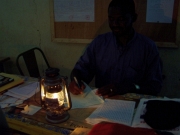 For the more fortunate children who are able to attend school, preparing for lessons and exams is difficult. It gets dark by six pm every evening. From then on Kerosene lamps are the only source of light. These lamps are expensive, and the weak light and soot they produce can be harmful to health. As well as this, teachers are not able to plan the following day’s teaching the evening before, which affects the quality of teaching. These problems contribute to the low percentage of children that graduate from school.
For the more fortunate children who are able to attend school, preparing for lessons and exams is difficult. It gets dark by six pm every evening. From then on Kerosene lamps are the only source of light. These lamps are expensive, and the weak light and soot they produce can be harmful to health. As well as this, teachers are not able to plan the following day’s teaching the evening before, which affects the quality of teaching. These problems contribute to the low percentage of children that graduate from school.
Programme Idea
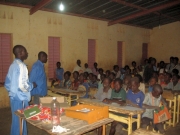
Just one simple solar power system can provide enough energy to light one or two classrooms for up to six hours every evening. This can transform the village school into a place of learning in the evening hours, where pupils can get on with their homework and teachers can plan lessons properly for the day ahead. The inhabitants of the village can also benefit from their community’s newly-lit facility, which can offer literacy courses for adults in the evenings. Furthermore the school can be used for village community events, such as elections, meetings and celebrations.
Having light in the evenings is a clear indication and symbol of development in rural regions. People are proud of this progress and consequently more parents are sensitised to the importance of education and as a result more send their children to school. A solar power system in a school makes learning more accessible to children, improves the quality of teaching and increases access to education.
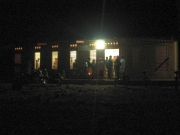 Pupils at schools in Germany can also benefit from the project by signing up for a partnership with a school in Burkina Faso. Each project is extensively documented and informative literature is individually compiled. In many cases, a letter exchange has also been set up between pupils at both schools. All of this allows the pupils to relate to something accessible and real within the subject field of development cooperation. Lessons on the topic of the ‘third world’ are therefore made much more engaging and personal.
Pupils at schools in Germany can also benefit from the project by signing up for a partnership with a school in Burkina Faso. Each project is extensively documented and informative literature is individually compiled. In many cases, a letter exchange has also been set up between pupils at both schools. All of this allows the pupils to relate to something accessible and real within the subject field of development cooperation. Lessons on the topic of the ‘third world’ are therefore made much more engaging and personal.
Objectives of the Programme
- To improve educational opportunites in Burkina Faso
- To improve the quality of school education in Burkina Faso
- To promote the school as the political and cultural centre of a village
- To promote communication between schools in Germany and Burkina Faso
- To enable German schools to play their part in an accessible project in the field of development cooperation and to deal with existing problems in the so-called ‘third world’.
History of the Programme
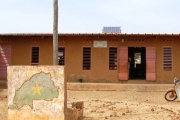
SEWA provided electricty to the first school in Burkina Faso in 2000. Over the subsequent years SEWA has acquired vast experience from its projects. For example having learnt from previous experience, the expensive solar panels were welded firmly to the roofs in order to protect them from theft. SEWA attaches great importance to extensive project monitoring and learning. Each school involved in the project is visited once before installing the solar power system as well as after electrification at least three times at regular intervals. To date SEWA and its partners in Germany and Burkina Faso have helped to provide 55 schools in Burkina Faso with solar power systems. Our projects have proved successful with a significant increase in the number of pupils graduating from schools in Burkina Faso.
Conducting the Programme
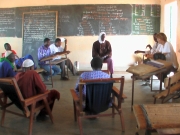
SEWA always works with a German partner, such as a school, an organisation or a company, when conducting a project electrifying a school in Burkina Faso. SEWA looks for a suitable school in Burkina Faso, comes up with a project proposal, looks after the sensitisation of those who will be responsible on the ground and finally organises the installation of the solar power system. The technical work is carried out by our partner, the electronics company Microsow. This ensures that local jobs are created in the field of solar energy in the long-term too. SEWA’s team in Burkina Faso is involved in the project throughout its duration, including regular monitoring visits. Through these visits, we are personally assured of the success of the project in each and every school. The project outputs are extensively documented. The German project partner looks after the project’s financing. To electrify one school, the entire project costs approximately €3,000. After electrification, the school in Burkina Faso assumes responsibility for the solar power system and commits itself to saving money for maintenance and repairs such as replacing broken lamps.
Your Help
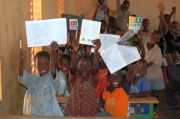 Become a project partner and help supply electricity to a school in Burkina Faso! As an example, a primary school in the village of Saya is currently waiting for a solar power system to be fitted. We document our project extensively with reports, photos and a project film. All of this material is made available to you to allow you as sponsors to communicate your commitment to the project should you so wish. We also provide information material on request to German schools in partnership with schools in Burkina Faso, and this can also be used in classes, giving pupils a vivid and realistic educational reference within developing countries. We also encourage schools to make direct and personal contact with their partner school in Burkina Faso.
Become a project partner and help supply electricity to a school in Burkina Faso! As an example, a primary school in the village of Saya is currently waiting for a solar power system to be fitted. We document our project extensively with reports, photos and a project film. All of this material is made available to you to allow you as sponsors to communicate your commitment to the project should you so wish. We also provide information material on request to German schools in partnership with schools in Burkina Faso, and this can also be used in classes, giving pupils a vivid and realistic educational reference within developing countries. We also encourage schools to make direct and personal contact with their partner school in Burkina Faso.
Contact
Nils Goldbeck (Projectmanager)
E-Mail: nils.goldbeck@solar-afrika.de

